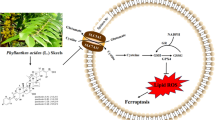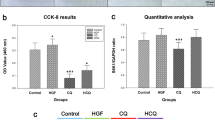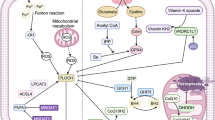Abstract
Background
Vitamin K2 (VK2) has been reported to induce apoptosis in many types of cancer cells including leukemia. However, there are no precise reports regarding the breast cancer cells. From the stand point of clinical implications of VK2 including chemoprevention, we investigated the effects of VK2 on breast cancer cell lines.
Methods
Breast cancer cell lines were cultured with VK2, and the cytotoxicity and cell death phenotype were examined. The HL-60 leukemia cells were used as a control for VK2-induced apoptosis.
Results
VK2 exhibited the cytotoxic effect, especially in triple negative breast cancer cell lines, namely, MDA-MB-231 and MDA-MB-468. However, in contrast to HL-60 cells, typical features of the cells undergoing apoptosis, such as chromatin condensation, nuclear fragments, and cleavage of caspase-3 were not detected. Transmission electron microscopy exhibited an increased number of autophagosomes/autolysosomes with plasma membrane integrity. An autophagy inhibitor, 3-methyladenine, apparently attenuated VK2-induced cytotoxicity, which indicated the involvement of autophagy-dependent cell death. Interestingly, both VK2-induced non-apoptotic cell death in MDA-MB-231 cells and VK2-induced apoptosis in HL-60 cells were suppressed in the presence of reactive oxygen species (ROS) scavengers. Therefore, ROS production by VK2 seems to be located up-stream in the molecular machinery for both the types of cell death execution.
Conclusion
The VK2 induced non-apoptotic cell death along with autophagy, in triple negative breast cancer cell lines. Cell death phenotype induced by VK2 appears to differ among the type of cancers. This suggests the possibility of using VK2 for the breast cancer therapy.






Similar content being viewed by others
References
Bray F, Ferlay J, Soerjomataram I, Siegel RL, Torre LA, Jemal A. Global cancer statistics 2018: GLOBOCAN estimates of incidence and mortality worldwide for 36 cancers in 185 countries. CA Cancer J Clin. 2018;68:394–424.
Olson RE. The function and metabolism of vitamin K. Ann Rev Nutr. 1984;4:281–337.
Fusaro M, Mereu MC, Aghi A, Iervasi G, Gallieni M. Vitamin K and bone. Clin Cases Miner Bone Metab. 2017;14:200–6.
Lamson DW, Plaza SM. The anticancer effects of vitamin K. Altern Med Rev. 2003;8:303–18.
Duthie SJ, Grant MH. The toxicity of menadione and mitoxantrone in human liver-derived Hep G2 hepatoma cells. Biochem Pharmacol. 1989;38:1247–55.
Hitomi M, Yokoyama F, Kita Y, Nonomura T, Masaki T, Yoshiji H, et al. Antitumor effects of vitamins K1, K2 and K3 on hepatocellular carcinoma in vitro and in vivo. Int J Oncol. 2005;26:713–20.
Tokita H, Tsuchida A, Miyazawa K, Ohyashiki K, Katayanagi S, Sudo H, et al. Vitamin K2-induced antitumor effects via cell-cycle arrest and apoptosis in gastric cancer cell lines. Int J Mol Med. 2006;17:235–43.
Kawakita H, Tsuchida A, Miyazawa K, Naito M, Shigoka M, Kyo B, et al. Growth inhibitory effects of vitamin K2 on colon cancer cell lines via different types of cell death including autophagy and apoptosis. Int J Mol Med. 2009;23:709–16.
Yoshida T, Miyazawa K, Kasuga I, Yokoyama T, Minemura K, Ustumi K, et al. Apoptosis induction of vitamin K2 in lung carcinoma cell lines: the possibility of vitamin K2 therapy for lung cancer. Int J Oncol. 2003;23:627–32.
Shibayama-Imazu T, Sonoda I, Sakairi S, Aiuchi T, Ann WW, Nakajo S, et al. Production of superoxide and dissipation of mitochondrial transmembrane potential by vitamin K2 trigger apoptosis in human ovarian cancer TYK-nu cells. Apoptosis. 2006;11:1535–43.
Xv F, Chen J, Duan L, Li S. Research progress on the anticancer effects of vitamin K2. Oncol Lett. 2018;15:8926–34.
Orimo H, Shiraki M, Tomita A, Morri H, Fujita T, Ohata M. Effects of menatetrenone on the bone and calcium metabolism in osteoporosis: a double-blind placebo-controlled study. J Bone Miner Metab. 1998;16:106–12.
Ishii M, Shimomura M, Hasegawa J, Morishita N, Nakai H, Kayano M, et al. Evaluation of pharmacokinetics and bioequivalence of soft capsules of menatetrenone. J Clin Therap Med. 1992;8:571–85.
Tadano K, Yuzuriha T, Miyake Y. The placental and mammary transport of [14C]menaquinone-4 in rats. J Nutr Sci Vitaminol (Tokyo). 1989;35:393–405.
Harshman SG, Fu X, Karl JP, Barger K, Lamon-Fava S, Kuliopulos A, et al. Tissue concentrations of vitamin K and expression of key enzymes of vitamin K metabolism are influenced by sex and diet but not housing in C57Bl6 Mice. J Nutr. 2016;146:1521–7.
Kao J, Salari K, Bocanegra M, Choi YL, Girard L, Gandhi J, et al. Molecular profiling of breast cancer cell lines defines relevant tumor models and provides a resource for cancer gene discovery. PLoS ONE. 2009;4:e6146. https://doi.org/10.1371/journal.pone.0006146.
Holliday DL, Speirs V. Choosing the right cell line for breast cancer research. Breast Cancer Res. 2011;13:215. https://doi.org/10.1186/bcr2889.
Saito Y, Moriya S, Kazama H, Hirasawa K, Miyahara K, Kokuba H, et al. Amino acid starvation culture condition sensitizes EGFR-expressing cancer cell lines to gefitinib-mediate cytotoxicity by inducing atypical necroptosis. Int J Oncol. 2018;52:1165–77.
Yaguchi M, Miyazawa K, Katagiri T, Nishimaki J, Kizaki M, Tohyama K, et al. Vitamin K2 and its derivatives induce apoptosis in leukemia cells and enhance the effect of all-trans retinoic acid. Leukemia. 1997;11:779–87.
Miyazawa K, Yaguchi M, Funato K, Gotoh A, Kawanishi Y, Nishizawa J, et al. Apoptosis/differentiation-inducing effects of vitamin K2 on HL-60 cells: dichotomous nature of vitamin K2 in leukemia cells. Leukemia. 2001;15:1111–7.
Petrie EJ, Czabotar PE, Murphy JM. The Structural basis of necroptotic cell death signaling. Trends Biochem Sci. 2019;44:53–63.
Declercq W, Vanden Berghe T, Vandenabeele P. RIP kinases at the crossroads of cell death and survival. Cell. 2009;138:229–32.
Tooze SA, Dooley HC, Jefferies HB, Joachim J, Judith D, Lamb CA, et al. Assessing mammalian autophagy. Methods Mol Biol. 2015;1270:155–65.
Klionsky DJ, Abdelmohsen K, Abe A, Abedin MJ, Abeliovich H, Arozena AA, et al. Guidelines for the use and interpretation of assays for monitoring autophaguy (3rd edition). Autophagy. 2016;12(1):1–222. https://doi.org/10.1080/15548627.2015.1100356.
Codogno P, Meijer AJ. Autophagy and signaling: their role in cell survival and cell death. Cell Death Differ. 2005;Suppl 2:1509–18.
Kroemer G, Levine B. Autophagic cell death: the story of a misnomer. Nat Rev Mol Cell Biol. 2008;9:1004–100.
Tabas I, Ron D. Integrating the mechanisms of apoptosis induced by endoplasmic reticulum stress. Nature Cell Biol. 2011;13:184–90.
Yokoyama T, Miyazawa K, Naito M, Toyotake J, Tauchi T, Itoh M, et al. Vitamin K2 induces autophagy and apoptosis simultaneously in leukemia cells. Autophagy. 2008;4:629–40.
Dong Z, Cui H. The autophagy-lysosomal pathways and their emerging roles in modulating proteostasis in tumors. Cells. 2018. https://doi.org/10.3390/cells8010004.
Poillet-Perez L, Despouy G, Delage-Mourroux R, Boyer-Guittaut M. Interplay between ROS and autophagy in cancer cells, from tumor initiation to cancer therapy. Redox Biol. 2015;4:184–92.
Scherz-Shouval R, Shvets E, Fass E, Shorer H, Gil L, Elazar Z. Reactive oxygen species are essential for autophagy and specifically regulate the activity of Atg4. EMBO J. 2007;26:1749–60.
Kim J, Kundu M, Viollet B, Guan KL. AMPK and mTOR regulate autophagy through direct phosphorylation of Ulk1. Nat Cell Biol. 2011;13:132–41.
Oyadomari S, Mori M. Roles of CHOP/GADD153 in endoplasmic reticulum stress. Cell Death Differ. 2004;11:381–9.
Beaudin S, Kokabee L, Welsh J. Divergent effects of vitamins K1 and K2 on triple negative breast cancer cells. Oncotarget. 2019;10:2292–305.
Karasawa S, Azuma M, Kasama T, Sakamoto S, Kabe Y, Imai T, et al. Vitamin K2 covalently binds to Bak and induces Bak-mediated apoptosis. Mol Pharmacol. 2013;83:613–20.
Habu D, Shiomi S, Tamori A, Takeda T, Tanaka T, Kubo S, et al. Role of vitamin K2 in the development of hepatocellular carcinoma in women with viral cirrhosis of the liver. JAMA. 2004;292:358–61.
Yoshida H, Shiratori Y, Kudo M, Shiina S, Mizuta T, Kojiro M, et al. Effect of vitamin K2 on the recurrence of hepatocellular carcinoma. Hepatology. 2011;54:532–40.
Wei G, Wang M, Hyslop T, Wang Z, Carr BI. Vitamin K enhancement of sorafenib-mediated HCC cell growth inhibition in vitro and in vivo. Int J Cancer. 2010;127:2949–58.
Jung DH, Hwang S, Song GW, Ryoo BY, Kim N, Tak E, Hong HN. An interim safety analysis of hepatocellular carcinoma patients administrating oral vitamin K with or without sorafenib. Korean J Hepatobil Pancreat. 2015;19:1–5.
Haruna Y, Hasegawa N, Imanaka K, Kawamoto S, Inoue A. Clinical impact of vitamin K dosing on sorafenib treatment for hepatocellular carcinoma. J Cancer. 2017;8:1988–94.
Acknowledgements
This study was supported by funds provided through the Strategic Research Foundation at Private Universities (S1411011, 2014–2018) from the Ministry of Education, Culture, Sports, Science and Technology (MEXT) of Japan and by JSPS KAKENHI Grant Numbers JP26460478 to KM. We would like to thank Editage (www.editage.jp) for English language editing.
Author information
Authors and Affiliations
Corresponding author
Ethics declarations
Conflict of interest
All authors declare that there is no conflict of interest.
Additional information
Publisher's Note
Springer Nature remains neutral with regard to jurisdictional claims in published maps and institutional affiliations.
Electronic supplementary material
Below is the link to the electronic supplementary material.
12282_2019_1012_MOESM1_ESM.pptx
Supplementary file1 (PPTX 83 kb) Supplemental Fig.1. Non-apoptotic cell death induction in breast cancer cell lines after treatment with VK2. Cells were treated with the indicated concentrations of VK2 for 24–96 h. Cellular proteins were extracted and analyzed by immunoblotting using anti-cleaved caspase-3 mAb. C-96 represents the cells cultured in control medium for 96 h. Posi-C represents HL-60 cell treated with staurosporine at 1 µM for 8 h as a positive control for apoptosis induction
About this article
Cite this article
Miyazawa, S., Moriya, S., Kokuba, H. et al. Vitamin K2 induces non-apoptotic cell death along with autophagosome formation in breast cancer cell lines. Breast Cancer 27, 225–235 (2020). https://doi.org/10.1007/s12282-019-01012-y
Received:
Accepted:
Published:
Issue Date:
DOI: https://doi.org/10.1007/s12282-019-01012-y




